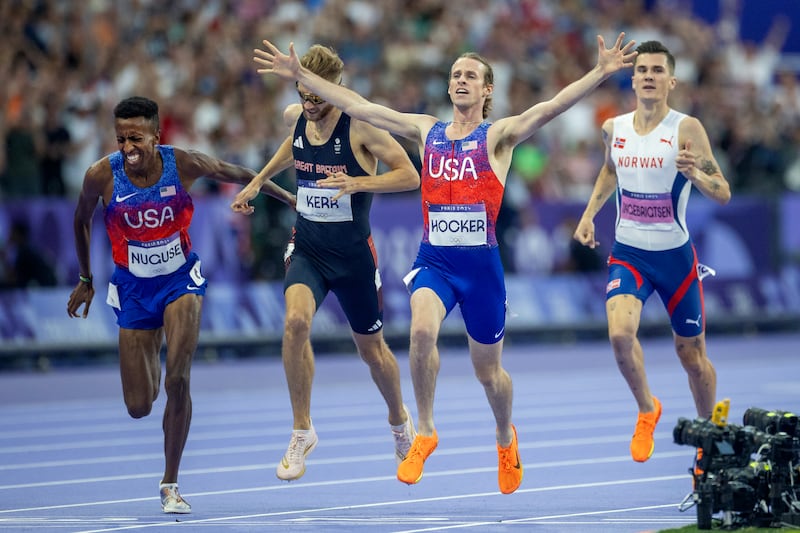Ingebrilliant… Ingecredible… Ingeinsane… Hard to believe it’s seven years since we had great fun making up words to describe the wonders of Jakob Ingebrigtsen. Time perhaps to give it another whirl.
Berlin’s Olympic Stadium was where Ingebrigtsen first announced himself on the main stage. In winning the 1,500m-5,000m double at 2018 European Championships, while still only 17, he was fast fulfilling his own prediction of becoming the best runner in the world
“I’ve been a professional runner since I was eight, nine, 10 years old,” he told us that night, in no way overawed by his own achievement, adamant he was only getting started.
It’s all been well charted too, from the 2016 documentary series for Norwegian TV, Team Ingebrigtsen, played out with an undeniable confidence, an attitude that overtly rejects Nordic egalitarianism by openly stating: “We will be the best.”
It’s one thing becoming the best runner in the world, another thing becoming it before your 21st birthday, on the biggest running stage of all. Fast forward a few years to the 2021 Tokyo Olympics, when inside the virtually empty Japan National Stadium Ingebrigtsen delivered one of the most flawlessly executed races in Olympic history. He won 1,500m gold in 3:28.32, breaking the Olympic record by just over three seconds, aged 20 years and 11 months.
When informed (by me) that he was the youngest 1,500m winner since Ronnie Delany, who was just 21 when he won in 1956, Ingebrigtsen broke into a mischievous smile. “Age for me is nothing but a number,” he said.
Well, Ingebrigtsen has endured some growing pains in the years since. He’s back in Tokyo this week for the World Championships, aged 24, only this time facing the biggest challenge of his career given he hasn’t raced anywhere in the last six months due to an Achilles injury recurrence.
 Cole Hocker celebrates winning the men’s 1,500m final at the Paris Olympics ahead of Josh Kerr (second), Yared Nuguse (third) and Jakob Ingebrigtsen (right, fourth). Photograph: Tim Clayton/Corbis via Getty Images
Cole Hocker celebrates winning the men’s 1,500m final at the Paris Olympics ahead of Josh Kerr (second), Yared Nuguse (third) and Jakob Ingebrigtsen (right, fourth). Photograph: Tim Clayton/Corbis via Getty Images
He’s also lost out on gold in his last three outdoor global 1,500m finals – the 2022 and 2023 World Championships, beaten into second place by Britain’s Jake Wightman and Jost Kerr respectively, before finishing fourth in last year’s Olympic final despite leading for most of the race.
In a chillingly frank interview with Jeremy Wilson of The Telegraph earlier this year, Ingebrigtsen admitted you never recover from losing an Olympic 1,500m. Although he did recover to win the 5,000m later that week in Paris.
“There’s definitely no way to get over something like that,” he said. “I’m a 1,500m runner, and the 1,500 has been the Formula One event of athletics for as long as I remember. I think 99 per cent of people who know sport knew that I was going to win that 5k. If you are both fastest and strongest, it’s going to be very difficult [to lose].”
Ingebrigtsen didn’t feel sorry for himself for long. In his first indoor race in Liévin, France in February, he lowered the world indoor mile record to 3:45.14, following that with a 1,500m-3,000m double at the European Indoors in Apeldoorn in March. That made it 23 European titles in all, including cross country and junior titles. Incidentally, his six European outdoors titles are one more than we’ve won as a country.
Two weeks later, he won the only gold medal missing from his collection, or rather two of them, claiming another 1,500m-3,000m double at the World Indoors in Nanjing, China. But he hasn’t started a race since.
 Jakob Ingebrigtsen during his father Gjert’s trial at South Rogaland District Court earlier this year. Photograph: Lise Aserud/NTB/AFP via Getty Images
Jakob Ingebrigtsen during his father Gjert’s trial at South Rogaland District Court earlier this year. Photograph: Lise Aserud/NTB/AFP via Getty Images
A day later, he was back in his hometown of Sandnes for the criminal trial of his father and former coach Gjert. It was February 2022 when Norway’s Stavanger Aftenblad newspaper first reported Gjert was stepping down from his role as coach to his three sons – Henrik, Filip, and Jakob, all of whom he coached to European titles – due to medical reasons. It later emerged there was more to the story.
Gjert was later accused of violence, threats and manipulative behaviour towards Jakob, and their younger sister, Ingrid. On June 16th, Gjert was convicted on one count of assault against Ingrid, but was acquitted of all other abuse charges. The 59-year-old was given a suspended prison sentence of 15 days and ordered to pay 10,000 NOK (€860) in compensation for hitting Ingrid with a towel three years prior.
No one truly knows how all that impacted Ingebrigtsen’s training ahead of the outdoor season, but he soon had other things to worry about in the build-up to Tokyo. An Achilles injury, which also interrupted his training early last year, was slow to respond to treatment, and he only returned to full training in the last month.
“Final track session complete, some faster 300s and 200s to end pre-camp here in Kyoto,” he posted on Instagram on Friday. “It’s been an unconventional build into World Champs but I’m ready to compete.”
He’d earlier posted a video reel playing the part of a gambler, rolling the dice, also telling Norwegian media earlier this week: “If I’m on the start line, I know that I’m a gold candidate… This is what I live for. To compete. It can’t be that difficult.”
Still, the last six months can’t have been easy. “I have taken the trip down to the injury cellar several times this spring, it has been pitch dark there,” he added. “This is more or less the worst case scenario for me, because I have had to sit home and watch the whole season go by.”
It’s not yet clear if he’ll line up in the 1,500m heats on Sunday or wait until the 5,000m later in the week, the event where he also bounced back to win gold in Budapest in 2023.
What is certain is that the Tokyo 1,500m is stacked with sticks of dynamite. Kerr and Wightman both return, Cole Hocker from the US is eminently capable of proving his Olympic gold was no fluke, and rising Dutch star Niels Laros has fast developed the most fearsome kick in the game.
If a race-sharp Ingebrigtsen could only manage fourth in Paris, winning in Tokyo would surely confirm his undisputed greatness, if he hasn’t claimed that already.


AloJapan.com